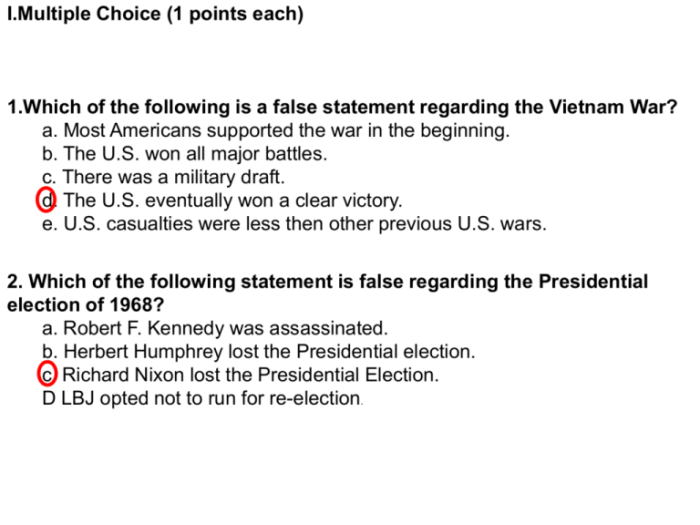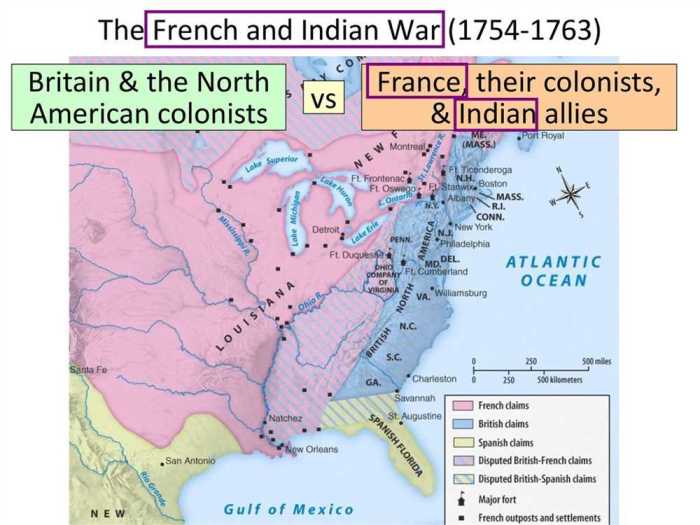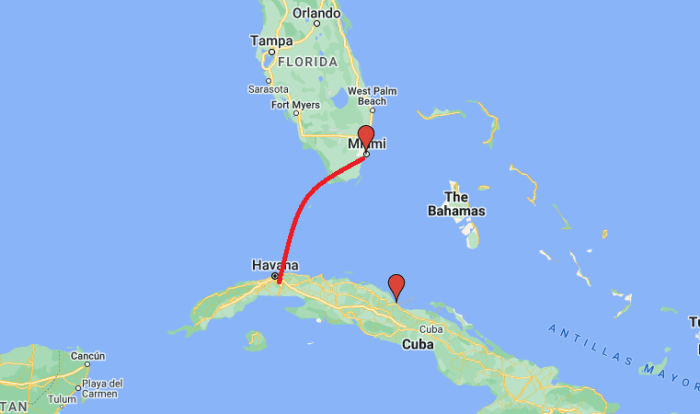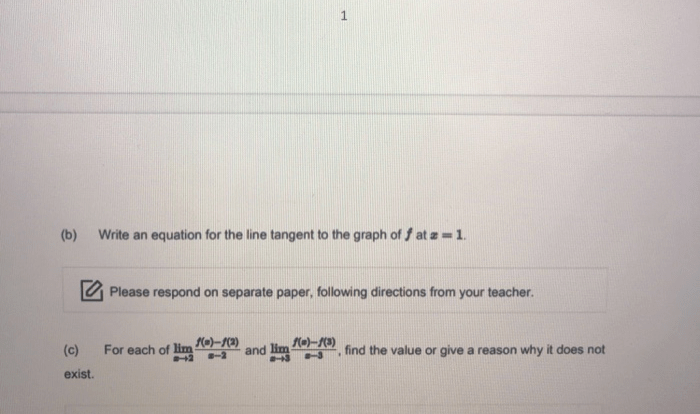With the Vietnam War DBQ Answer Key as our guide, we embark on a captivating journey through one of history’s most intricate and consequential conflicts. This comprehensive resource unlocks the complexities of the Vietnam War, offering a profound understanding of its origins, key events, and lasting legacy.
As we delve into the depths of this war, we will uncover the political and ideological clashes that ignited its flames, explore the domestic and international forces that fueled its escalation, and witness the transformative impact it had on Vietnam, the United States, and the global Cold War landscape.
Historical Background of the Vietnam War
The Vietnam War was a protracted and devastating conflict that shaped the course of the 20th century. Its origins lie in the complex political and ideological divisions that emerged in Vietnam following World War II.
Political and Ideological Conflicts
After the defeat of French colonial rule in 1954, Vietnam was divided along the 17th parallel into two separate states: North Vietnam, led by the communist Ho Chi Minh, and South Vietnam, supported by the United States and its allies.
The ideological divide between the two Vietnams was profound. North Vietnam sought to unify the country under communist rule, while South Vietnam embraced a capitalist and democratic system.
Role of the United States
The United States played a pivotal role in the origins of the Vietnam War. Fearing the spread of communism in Southeast Asia, the United States provided substantial economic and military aid to South Vietnam.
In 1964, following the Gulf of Tonkin incident, the United States Congress passed the Gulf of Tonkin Resolution, which authorized President Lyndon B. Johnson to use military force in Vietnam.
Timeline of Major Events
Key events leading up to the Vietnam War include:
- 1954: Geneva Accords divide Vietnam into North and South Vietnam.
- 1964: Gulf of Tonkin incident.
- 1965: United States begins bombing North Vietnam.
- 1968: Tet Offensive.
- 1973: Paris Peace Accords.
- 1975: Fall of Saigon; end of the Vietnam War.
Causes of the Vietnam War: Vietnam War Dbq Answer Key

The Vietnam War was a complex and multifaceted conflict that had both domestic and international roots. The war was rooted in the Cold War conflict between the United States and the Soviet Union, as well as the rise of nationalism and anti-colonialism in Vietnam.
Domestic Factors
Domestic factors played a significant role in the outbreak of the Vietnam War. The Vietnamese people had a long history of resistance to foreign occupation, and they were determined to achieve independence from French colonial rule. The Vietnamese Communist Party (VCP), founded in 1930, played a leading role in the resistance movement.
The VCP was committed to a Marxist-Leninist ideology, and it saw the war as a way to achieve a socialist revolution in Vietnam.
International Factors
International factors also contributed to the outbreak of the Vietnam War. The Cold War conflict between the United States and the Soviet Union played a major role in the war. The United States saw Vietnam as a potential domino that could fall to communism, and it was determined to prevent that from happening.
The Soviet Union, on the other hand, supported the VCP and provided it with military and economic aid.
Nationalism and Anti-Colonialism, Vietnam war dbq answer key
Nationalism and anti-colonialism were also important factors in the outbreak of the Vietnam War. The Vietnamese people were determined to achieve independence from foreign rule, and they saw the war as a way to achieve that goal. The war was also a reflection of the global anti-colonial movement that was sweeping the world at the time.
Key Events and Turning Points
The Vietnam War was marked by numerous key events and turning points that shaped its course and outcome. These events include major battles, diplomatic initiatives, and political decisions that had a significant impact on the war’s trajectory.
Battles and Offensives
The Vietnam War was characterized by several major battles and offensives, each of which played a significant role in the war’s progression.
| Event | Date | Significance | Impact |
|---|---|---|---|
| Gulf of Tonkin Incident | August 1964 | A reported attack on American destroyers in the Gulf of Tonkin, which led to the escalation of the war. | Increased US involvement and public support for the war. |
| Tet Offensive | January 1968 | A surprise attack by North Vietnamese forces on major cities in South Vietnam. | A psychological victory for North Vietnam and a turning point in the war, as it revealed the limits of US power. |
| Operation Linebacker II | December 1972 | A massive bombing campaign against North Vietnam. | Forced North Vietnam to return to the negotiating table. |
Diplomatic Initiatives
In addition to military operations, diplomatic initiatives also played a significant role in the Vietnam War.
| Event | Date | Significance | Impact |
|---|---|---|---|
| Geneva Accords | 1954 | An agreement that temporarily divided Vietnam into two zones, with the intention of eventual reunification. | Established a ceasefire and set the stage for future negotiations. |
| Paris Peace Accords | 1973 | An agreement that ended the war and called for the withdrawal of all US forces. | Officially ended the US involvement in the war and set the stage for the eventual reunification of Vietnam. |
Impact of the Vietnam War
The Vietnam War, a protracted and devastating conflict, left an indelible mark on the lives of millions, reshaping the political landscape and having far-reaching consequences for Vietnam, the United States, and the global Cold War dynamics.
Human Cost
The war exacted a heavy human toll. Estimates suggest that over 3 million Vietnamese civilians and soldiers perished, while the United States lost over 58,000 service members. The war also resulted in widespread displacement, with millions of Vietnamese fleeing their homes to escape the fighting.
Political and Economic Consequences for Vietnam
The war had profound political and economic consequences for Vietnam. The country was divided, with the communist North prevailing over the US-backed South in 1975. The war also devastated Vietnam’s economy, with widespread destruction of infrastructure and loss of human capital.
Political and Economic Consequences for the United States
The Vietnam War had a significant impact on American politics and society. The war’s unpopularity at home led to widespread protests and fueled anti-war sentiment. The war also placed a significant strain on the US economy, with the conflict costing billions of dollars.
The Vietnam War DBQ Answer Key provides insights into the complex causes and consequences of the conflict. Exploring the perspectives of both the United States and Vietnam, it offers a deeper understanding of the war’s impact. Similarly, “The Salutation to the Dawn” the salutation to the dawn provides a glimpse into the personal experiences of Vietnamese people during the war, shedding light on the human cost of conflict.
By examining both sources, students can gain a comprehensive understanding of the Vietnam War’s historical significance.
Impact on the Global Cold War Landscape
The Vietnam War played a pivotal role in shaping the global Cold War landscape. The US defeat in Vietnam marked a significant setback for the Western bloc and emboldened communist forces around the world. The war also highlighted the limits of US power and influence, and contributed to a shift in global power dynamics.
Legacy and Historical Significance

The Vietnam War had profound and lasting effects on Vietnamese society, culture, and the international stage. Its legacy continues to shape debates and influence foreign policy and military strategy.
Impact on Vietnamese Society and Culture
The war devastated Vietnam, causing immense loss of life and widespread destruction. The war also had a profound impact on Vietnamese culture, leading to a shift towards collectivism and a strong sense of national identity. The war also left a legacy of environmental damage, with the widespread use of Agent Orange and other defoliants having long-term consequences for the country’s ecosystems.
Impact on U.S. Foreign Policy and Military Strategy
The Vietnam War had a profound impact on U.S. foreign policy and military strategy. The war led to a loss of faith in the domino theory and a shift towards a more cautious approach to foreign intervention. The war also led to a reassessment of U.S.
military strategy, with a greater emphasis on counterinsurgency and unconventional warfare.
Historiography of the War and Ongoing Debates
The historiography of the Vietnam War is complex and contested, with ongoing debates about the causes, conduct, and consequences of the war. Historians continue to debate the role of the United States in the war, the motivations of the Vietnamese people, and the impact of the war on the region and the world.
Commonly Asked Questions
What is the significance of the Vietnam War DBQ Answer Key?
The Vietnam War DBQ Answer Key provides a comprehensive guide to understanding the causes, key events, and impact of the Vietnam War. It offers a valuable resource for students, researchers, and anyone seeking to deepen their knowledge of this pivotal conflict.
What are the key events covered in the Vietnam War DBQ Answer Key?
The Vietnam War DBQ Answer Key includes a detailed timeline of key events, such as the Gulf of Tonkin Incident, the Tet Offensive, and the Paris Peace Accords. It provides context and analysis for these events, helping readers understand their significance and impact.
How does the Vietnam War DBQ Answer Key address the impact of the war?
The Vietnam War DBQ Answer Key examines the human cost of the war, including casualties and displacement. It also analyzes the political, economic, and social consequences of the war for Vietnam, the United States, and Southeast Asia.


